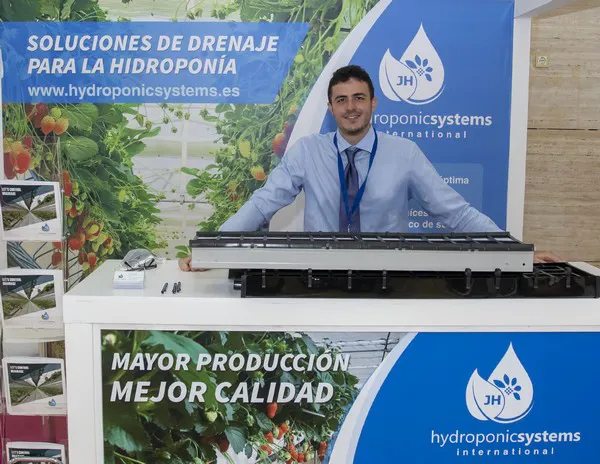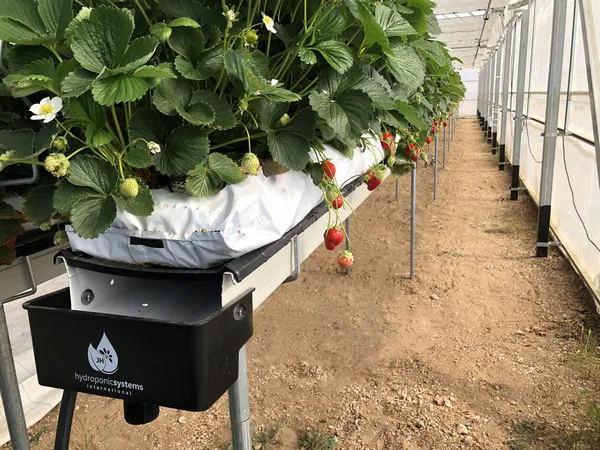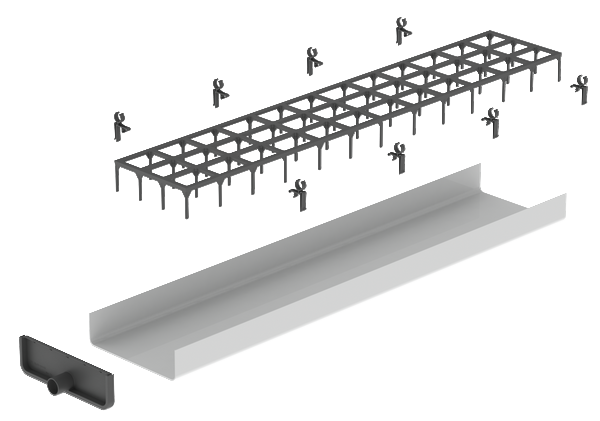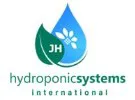Sustainability is one of the aspects most pursued by the agri-food industry and one of the most demanded by consumers. It is the cornerstone of both the evolution of the sector as a whole and of new developments, including hydroponics, which is gaining more and more ground in plant production.
"Hydroponics is becoming increasingly relevant given the growing concern for environmental protection. It is a versatile system that avoids soil degradation and makes it possible to grow crops anywhere in the world, regardless of the condition of the soil and, if the greenhouse technology allows it, also of the environmental conditions. In this way, it is possible to produce more, at any time of the year and purely locally, thus reducing transportation costs and the associated CO₂ emissions," says Antonio García, Export Manager of Hydroponic Systems.

Antonio García.
"Moreover, this is a sector in constant development thanks to the efforts of everyone involved. Our hydroponic systems, for example, use Spacer, an element that, through aeration, prevents excess humidity and the proliferation of root diseases, improving the condition of the plant and, therefore, its quality and yield."
Also, hydroponic agriculture optimizes the use of water, an essential resource whose scarcity has become a threat to very important producing regions in Spain. "Hydroponic cultivation systems allow water with nutrients to be reused, which in itself makes it possible to reduce water use by more than 50% compared to conventional irrigation. Moreover, at Hydroponic Systems, we manage to maximize drainage collection thanks to Spacer, thus saving even more on water and phytosanitary products."
Antonio says that the Murcia-based company is continuously working on developing new systems. "We currently have fourteen of them, ranging from systems supported directly on the ground with a polypropylene channel to elevated metal channel systems, which have been sold in more than 30 countries. Our secret is that we know how to adapt to the needs of each customer, offering them different sizes and characteristics in order to maximize the yield of their crops, from vegetables, strawberries, and blueberries to medicinal cannabis."

"We also collaborate with research centers such as TECNOVA in Spain and CEICKOR in Mexico. Moreover, our R&D team is preparing new projects that will be launched in the coming months," says the Export Manager.
Systems for growing berries
"At the moment, the best solution is the HS Evolution System, designed by our R&D team as the world's first sheet metal hydroponic trough with built-in Spacer. This Spacer ensures there is enough space between the plant roots and the base of the trough with the drains, maximizing aeration and preventing the contact of the drains and trough with the roots, which is what gives the most headaches to technicians dealing with waterlogging and root diseases."
"Our customers, including professional agronomists around the world, have been getting better results thanks to HS Evolution for strawberries. A few weeks ago, in fact, we finished a project in northern Europe for the elevated cultivation of strawberries during the winter at sub-zero temperatures, which already says a lot about how well this system works in greenhouses," says Antonio.
 HS Evolution System.
HS Evolution System.
Hydroponics, sustainability, and ecology
The FAO describes sustainable agriculture as one meeting the needs of present and future generations while ensuring profitability, environmental health, and social and economic equity. Hydroponic agriculture offers the possibility of contributing to this goal, as the European Commission itself acknowledged this summer in a written response to a Spanish MEP's question on hydroponic production.
"Hydroponics is unquestionably related to environmental protection. The technology guarantees many benefits for the ecosystem because, as we have commented, it avoids soil degradation, which, according to UN sources, could affect more than 90% of the soil by 2050, and makes it possible to save on water and phytosanitary products, which can also damage it."
Soil and its protection are, in fact, the focus of a new strategy presented last November by the European Commission to ensure that all soils on the continent are rehabilitated, resilient, and adequately protected. However, just the fact that it does not use soil means that hydroponic production cannot be certified as organic, according to current EU organic standards.
"It's a point of view that is linked to traditional farming methods. Until now, the thought processes have been soil-oriented because there were no alternatives. Luckily, technology and research have made enough progress to develop plant food production systems that replicate soil conditions and are environmentally friendly. For example, our drainage collection systems are designed to work with substrates such as coconut fiber, which are naturally sourced."
"Progress in terms of innovation and technology is unstoppable and regulations will have to adapt, as is already happening in other countries," says Antonio García. "However, at the moment, the big challenge for everyone is to overcome the shortage of raw materials and the transportation crisis derived from the COVID-19 pandemic. For us, the main challenge is to better ourselves, to remain at the forefront of development, and to be able to have an ever better, more efficient, more optimized, and more sustainable portfolio of hydroponic solutions."
 For more information:
For more information:
Antonio García
Hydroponic Systems
Avda. Juan Carlos I, n.º 43; 4º B
30009 Murcia, Spain
Tel.: +34 968 898 181
info@hydroponicsystems.es
www.hydroponicsystems.eu
